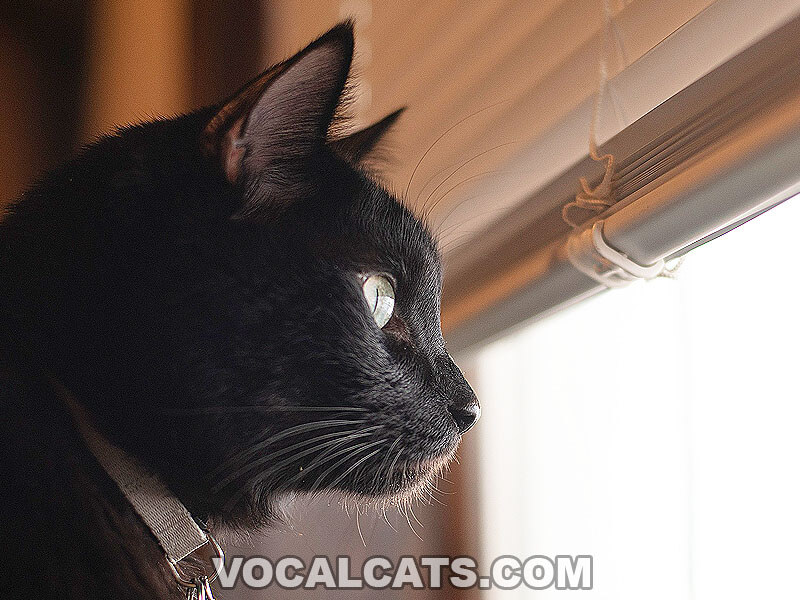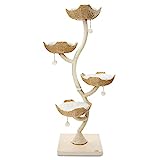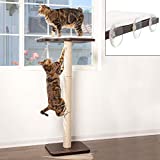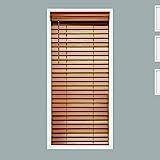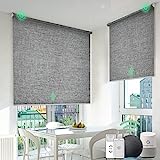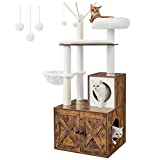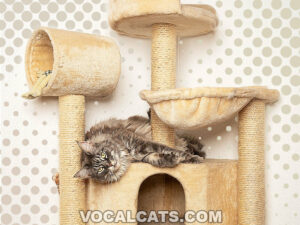Why Does My Cat Look Out The Window All Day? Your cat’s innate curiosity is what drives him to look out the window all day. Looking at your cat’s body, you’ll see that he’s designed to observe the surroundings. Those eyes, ears, nose, and whiskers are full of sensory features that can detect danger, food, and any changes in the environment.
In the wild, cats had to be constantly on their toes to watch out for enemies. This instinctual behavior is still very intact among domesticated cats.
For today’s article, we will look into the various reasons why cats look out the window and is always sitting on your windowsill. Is it just a simple sightseeing activity or could there be a medical explanation like the estrus cycle? Read on to understand our feline friend’s behavior.
Contents
- Why Does My Cat Stare Out The Window All Day?
- My Cat Looks Out The Window All Day! Should I be worried?
- Understanding Cats’ Sensory Capabilities
- The Window: A Portal to the Outside World
- Predatory Instincts and Play Behavior
- Importance of Mental and Visual Stimulation for Indoor Cats
- Importance of Physical Stimulation for Indoor Cats
- Addressing Potential Concerns
- Cats Are Naturally Curious Animals
- Random Sounds Outside The Window During the Day
- Your Cat Likes to Guard The House During the Day
- Cat’s Estrus Cycle
- Cognitive Decline in Senior Cats
- Why Does My Cat Keep Looking Out The Window And Meowing?
- Why Does My Male Cat Look Out The Window And Meow?
- So, Why Does My Cat Look Out The Window All Day?
- Related Questions
Why Does My Cat Stare Out The Window All Day?
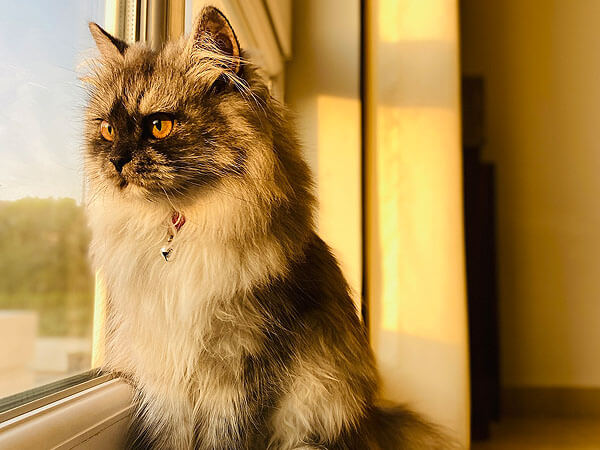
As a cat parent, one of the interesting issues to understand is why my cat stares out the window all day. As mentioned in the introduction, curiosity is a huge factor in this deeply-rooted behavior.
Curiosity
In the cat’s world, curiosity can lead to suspicions. Your cat stares at the windows because he is suspicious of an impending danger out there such as cats and other predators.
Plus, territorial behavior explains why cats always look out the window. It’s not surprising to hear cats meow out loud to shoo away other cat/s jumping in your vicinity.
RECOMMENDED: How To Keep Cats Away From Blinds?
To get some sun
Your cat sits by the windowsill during the daytime to reap the benefits of sunlight. Your cat’s body temperature is higher than yours, so he can tolerate heat more than you can.
During sleep, his body temperature slightly drops and to raise it, he’d seek the sun by sitting and looking out the window. Plus, sunlight is a good source of vitamin D.
Waiting for you
Your cat looks out the window simply because he is waiting for you. Being alone in the house leads to separation anxiety and boredom. So, to while away the time, he’d amuse himself by observing the happenings outside.
My Cat Looks Out The Window All Day! Should I be worried?
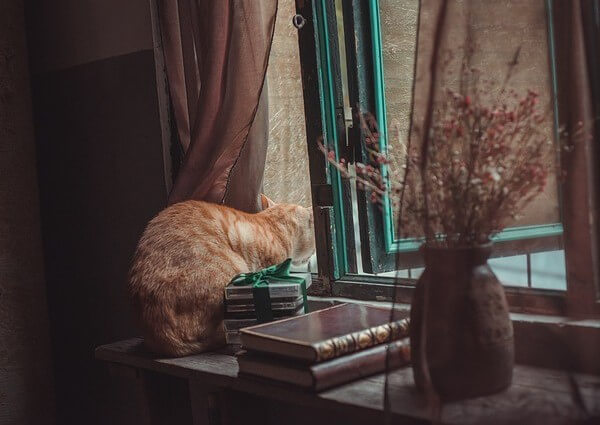
No, there is nothing serious if a cat sits in window all day. Cats are programmed to be observant of their surroundings. How many times have you seen outdoor cats climb on top of the trees?
They do this not just as a form of play but to place themselves ahead of the game against predators. The same reason why your cat stares out window all day.
Your cat’s senses are very sensitive to smell, sounds, and even distance. Stay with me as I explain to you how your cat’s sensory perception is different from yours.
READ ALSO: How To Keep Cats Out Of Windows?
Understanding Cats’ Sensory Capabilities
Cats are efficient hunters because of their senses which are even heightened by their powerful whiskers. They are very good at detecting movements, sounds, and smell even at the crack of dawn and at night.
Sense of hearing
Cat’s sense of hearing is more sensitive than other mammals. Their sense of hearing can be compared with an advanced satellite dish that can pick up sounds from afar.
Your cat can hear even the slightest movement around your home. The investigator in him is one of the reasons he sits by the window all day.
Sense of sight
What makes our eyesight different from that of our cats? For one, cats are gifted with tapetum lucidum, a layer of eye tissue that allows them to have clear vision even in low-light situations.
Add to that is the spectacular 200 degrees field of view of cats compared to us which is only 180 degrees. This allows them to see their prey at dusk and night which humans aren’t good at.
But we outshine them in the number of light receptors or cones. These cones allow us to recognize a wide range of vibrant colors which cats aren’t capable of. But cats’ whiskers assist them in ‘seeing’ things clearer.
So, how do these visions affect our cat’s fascination with windows? Cats are crepuscular mammals, meaning, they are active at dawn and dusk. So seeing your cat very early in the morning and looking out at the window is because he is already watching for interesting stimulation outside the confines of his home.
DON’T MISS: Blue Eyed White Ragdoll (Complete Guide)
Sense of smell
Cats have over 200 million odor receptors compared to just about 5 million in humans. This brings out the hunter in domesticated cats. They are likely smelling something interesting outside.
The Window: A Portal to the Outside World
The window provides cats with a lot of interesting stimuli, one of which is people-watching. They are also fascinated with moving objects like cars and bikes.
Since cats are creatures of habit, they can gauge the time when you’d get back home. So, he is sitting on the windowsill eagerly watching for your arrival.
Predatory Instincts and Play Behavior
Cats are hunters by nature and indoor cats have this innate yearning to hunt for prey. Cats mimic the behavior of their ancestors by perching themselves up high on a piece of furniture like a window sill.
This is to have a good vantage point while looking for prey such as insects, birds, and smaller animals. Plus, of course, they may also be searching for other cats to play with.
Importance of Mental and Visual Stimulation for Indoor Cats
Indoor cats must have both mental and visual stimulation. Providing them with mentally challenging activities and visual access to the outside world helps to arouse their natural impulses for predation.
Indoor cats that are not provided with such stimulation get bored easily and may resort to unwanted behaviors, such as aggression and soiling in inappropriate areas. Studies also noted that bored cats spend more time sleeping than those who are mentally active.
CHECK OUT: Why Does My Cat Sleep On My Head, Face and Neck? 10 Reasons Why!
Providing indoor cats access to a window allows them to explore their surroundings. Seeing small birds and other smaller wildlife stimulates their hunting instincts even if they cannot act on it.
Giving your cat an elevated place to perch, such as a cat tree or cat condo, where they could observe what’s going on around the house, will enrich their environment even more.
If you do not have a window sitting area, you can install window mounts or cat hammocks that can be placed beside a window which will give your cat a good vantage point of the outside world.
Importance of Physical Stimulation for Indoor Cats
Indoor cats can easily gain weight if not exercised regularly. Obesity shortens the life expectancy of a cat and will increase the risk of diabetes, heart disease, cancer, and osteoarthritis.
Addressing Potential Concerns
While it is perfectly normal for cats to watch the world outside through the window, sometimes accidents can happen when your cat suddenly spots something that made it jump. Open windows and window treatments that have exposed chords can pose a danger to an excited cat.
Here are some tips you can employ to ensure that their window-watching remains safe.
- Install a screen or window guards to prevent them from escaping or worse, falling down the window.
- If you want to keep your cat away from the window for some reason, you can spray the area with a lemon scent that cats find annoying.
- Placing double-sided tape on the window area will also deter them since they find the sticky feeling weird.
You’ll also want to consider using window blinds that are cat-proof. One of the risks that regular blinds pose is the dangling chords that are a magnet for your cat to play with. These could easily tangle with their legs and body. Sometimes, their weight could bring down the whole blind.
Thus, it’s best to consider cordless or motorized blinds like these two to keep your furry friends safe.
Opt for wooden or faux wood blinds that have wide slats. These blinds are sturdy enough and not easily bendable for a cat to squeeze through, unlike aluminum blinds. The wide slats also provide them with a decent view of the outside when opened.
Cats Are Naturally Curious Animals
Cats are instinctively curious because they need it to survive. Their bodies are physiologically attuned to deal with their environment.
Not only do their eyes detect motion in low light conditions, but their sense of hearing and smell are also very keen and sensitive. It is for these reasons that your indoor cat would find a window a good place to look, smell and hear the world around them.
So, what can you do if you see your cat always staying by the window and feeling bored?
One recommendation is to take them out for walks. This is a great form of exercise to get them more active and promotes better health. Just make sure your cat is comfortable with it and that they are properly leashed or harnessed to prevent escaping.
Getting a second cat or pet is also another option. This not only prevents boredom but the companionship builds confidence and improves their social skills.
Random Sounds Outside The Window During the Day
Cats have a keen sense of hearing that can pick out as much as four times as we humans can hear. This is why you may sometimes observe your cat bolting near the window for no apparent reason.
Cats have a deep and tapered ear canal that can carry sound much more effectively to the eardrum. They can hear frequencies of up to 85 kHz compared to the human maximum of only 20 kHz.
Their broad hearing range can make out low rumbling sounds to the high-pitched sounds most of their prey emit, like birds and rodents.
Your Cat Likes to Guard The House During the Day
Cats are territorial just like any other member of the animal kingdom. They would guard or be on the lookout for your home because it is where their main food source comes from and also where they rest.
Staring out of windows may be their way to look out for possible threats to their abode.
DON’T MISS: Why Does My Cat Sleep On My Pillow? 13 Reasons Why!
Cat’s Estrus Cycle
When your cat is in heat, she will naturally look for a mate to reproduce. Cats are polyestrous, meaning, they go into heat every 10 to 40 days.
Cats in heat meow more and louder, are extra affectionate, and will look out in the window more often hoping to find a partner. The same is true for unneutered males who’d always search for a female in heat.
Cognitive Decline in Senior Cats
Age comes with cognitive and behavioral changes. Older cats’ levels of activities decline, they don’t go out as much anymore and are asleep most of the time.
Some of them experience feline dementia with over-clinginess as one of the signs. If you’re out of the house, your senior cat may be looking out the window because he is searching for you.
Why Does My Cat Keep Looking Out The Window And Meowing?
The reason why your cat keeps looking out the window and meowing is that he just wants to go outside or he has seen something that piques his interest.
Most cats enjoy being outdoors where they can explore and go on adventures. Your cat may call your attention by meowing or making chattering sounds because the window is barring him from preying on a bird that flew by or a rodent that it has observed skittering away.
A female cat that makes lengthy yowling sounds, on the other hand, maybe a sign that she is calling out potential mates. You may observe this behavior if the female cat hasn’t been spayed.
RECOMMENDED: Are Ragdoll Cats Talkative Or Vocal?
Why Does My Male Cat Look Out The Window And Meow?
Male indoor cats may become restless during the mating period which causes them to stare out of the window and meow constantly. You may notice them scratching the window or door to escape since they may have caught the odor of a female cat’s pee that is in heat.
READ NEXT: Cat Scratching Litter Box Excessively (10 Reasons Why & What To Do!)
If your cat likes scratching, investing in a scratching or climbing post for your fuzzy friend can provide a safe and appropriate outlet for their natural instinct to scratch. This would protect your windows and other furniture from damage.
These posts can also enhance your cat’s physical and mental well-being by encouraging exercise, reducing stress, and providing an area for play and exploration.
Moreover, a well-placed scratching post near the window can continue to give your cat a lovely view of the outdoors while simultaneously redirecting his scratching behavior.
So, Why Does My Cat Look Out The Window All Day?
As cat owners, it is important to learn as much as we can about their behavior to better support their needs. Looking out from the windows is one such example of a cat’s behavior that satisfies their curiosity of the outside world which also stimulates their mental and physical well-being.
You can encourage this instinctual need by providing them with a cat mount or cat tree to boost their entertainment or stimulation.
RECOMMENDED: How To Clean A Cat Tree (10 Easy Steps)
On this website, we are constantly creating content that will give you information regarding the enrichment of your beloved feline’s life. We suggest subscribing so you would be up-to-date on our articles.
Related Questions
Yes, you need to let your indoor cat satisfy their curiosity by providing them with access to a window. Lack of mental stimulation leads to boredom and may trigger unwanted and frustrating behaviors.
Cats are naturally curious and they stare out of windows to look for possible prey or to be aware of possible predators. It is part of their predatory instincts. They also like to feel the warmth of sunlight to make up for the slight drop in body temperature after sleeping.
While it is normal for a cat to gaze at the wall from time to time, it may be a sign of some medical condition, such as cognitive disorder or vision loss, if the behavior is not part of their usual routine. Cats have acute hearing and eyesight, and they may have picked up something on the wall or beneath it that aroused their curiosity.
DISCLAIMER: THIS WEBSITE DOES NOT PROVIDE MEDICAL ADVICE
The information, including but not limited to, text, graphics, images and other material contained on this website are for informational purposes only. No material on this site is intended to be a substitute for professional veterinary advice, diagnosis, or treatment. Always seek the advice of your veterinarian or other qualified health care provider with any questions you may have regarding a medical condition.
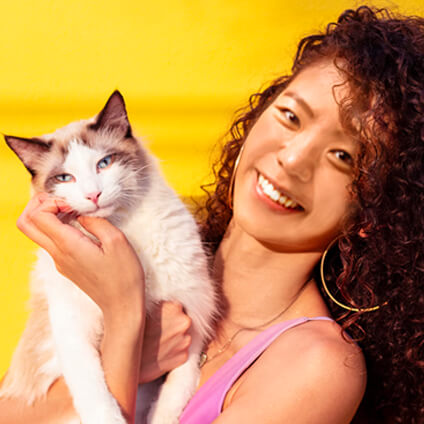
With over five years of specialized experience as an animal writer, my expertise lies in cat nutrition, health, behavior, grooming, and training. I am dedicated to delivering helpful and informative content that caters to the well-being of our feline friends. My primary goal is to empower pet owners with knowledge and ensure our feline companions thrive in health and happiness. In my free time, I love volunteering at local cat rescue centers.
